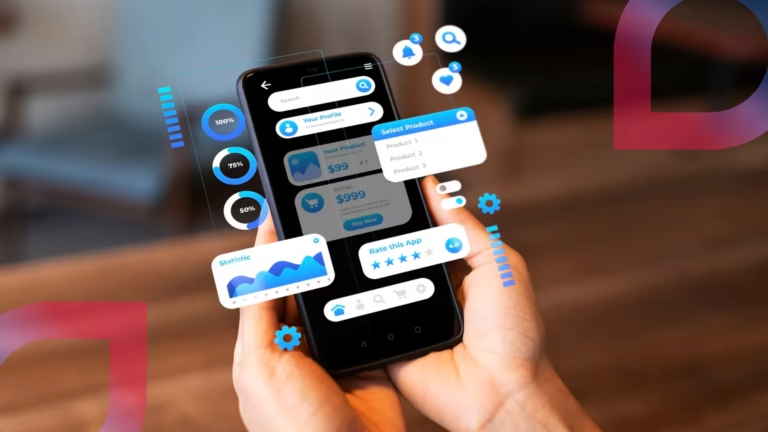
Introduction to Website Design
Website design encompasses a variety of disciplines and skills that are utilized in the production and maintenance of websites. This multifaceted field is essential for businesses seeking to establish a robust online presence, particularly in a competitive marketplace like Indianapolis, Indiana. A well-crafted website serves as the digital front of a company, embodying its brand identity while simultaneously engaging users effectively. This interaction is critical, as it can significantly influence user perception and conversion rates.
In the contemporary digital landscape, the significance of website design cannot be overstated. It plays a vital role in defining how visitors perceive a business and can directly impact their decision-making processes. A skilled website designer in Indianapolis will focus on various elements, including user experience (UX), aesthetics, and functionality. A seamless user experience ensures that visitors can navigate the website with ease, ultimately leading them to take desired actions, such as making purchases or reaching out for more information.
Furthermore, responsiveness is a key aspect of modern web design. With an increasing number of users accessing websites via mobile devices, it is imperative that a website functions optimally across all platforms. A competent web developer must incorporate responsive design principles to ensure that the website adapts smoothly to different screen sizes and resolutions, providing a consistent experience for all visitors. Additionally, the aesthetic appeal of a website influences user engagement. Colors, typography, and layout all contribute to the overall impression a user has, and an aesthetically pleasing site can foster trust and encourage return visits.
Ultimately, investing in quality website design is invaluable for businesses aiming to thrive in the digital age. By enhancing their online presence with the expertise of a web designer in Indianapolis, Indiana, companies can effectively communicate their brand message and attract a larger audience.
Why Choose a Local Website Designer in Indianapolis?
Choosing a local website designer in Indianapolis offers numerous advantages tailored to meet the unique needs of businesses in the area. One of the primary benefits is the designer’s deep understanding of local market trends. This insight enables them to create websites that resonate with the local audience, enhancing user engagement and conversion rates. A web designer familiar with Indianapolis knows what appeals to residents and visitors alike, which can be instrumental in crafting a digital presence that attracts the right clients.
Effective communication is another significant factor when hiring a local web developer. Working with someone in Indianapolis allows for face-to-face meetings, which can foster a stronger working relationship. This direct interaction facilitates a clearer understanding of your vision and expectations, ensuring that the final product aligns with your business goals. Moreover, local designers often have established networks of professionals, such as photographers, writers, and marketers, which can further enhance the overall quality of your website.
Supporting local businesses is a vital aspect of community development. By selecting a website designer based in Indianapolis, you contribute to the local economy, helping to create jobs and promote growth within the community. Many local designers are passionate about their work and invested in their clientele’s success, often going the extra mile to ensure satisfaction. Testimonials from satisfied customers highlight the positive outcomes of working with Indianapolis web designers. Case studies of successful local projects can demonstrate the impact a well-designed website has on area businesses, providing evidence of the effectiveness of choosing a local expert.
In conclusion, hiring a local website designer in Indianapolis not only enhances communication and market understanding but also supports community development, making it a strategic choice for businesses looking to enhance their online presence.
Key Qualities to Look for in a Website Designer
When searching for a website designer in Indianapolis, it is essential to consider several key qualities that will determine the effectiveness and success of your web project. A competent web designer must possess a blend of technical skills, creativity, and strong communication abilities to ensure a seamless process.
First and foremost, a deep understanding of technical skills is crucial. A proficient website designer should be well-versed in languages such as HTML and CSS, which form the building blocks of web development. Knowledge of JavaScript can further enhance interactive features on the website, while familiarity with content management systems (CMS) like WordPress or Drupal is advantageous. This technical prowess enables a designer to translate ideas into functional websites effectively.
Creativity is another vital attribute. A skilled web designer should demonstrate originality in their work, presenting unique visual elements that align with branding and engage users. This creativity often manifests in their portfolio, which is one of the best indicators of a designer’s capabilities. A diverse portfolio showcasing various styles and projects reflects adaptability and experience, making it easier to assess whether their creative vision resonates with your expectations.
Good communication skills are equally important in the realm of web design. A website designer should be able to articulate ideas clearly, understand client feedback, and translate requirements into actionable items. This ensures that the design process progresses smoothly, reducing misunderstandings that could lead to rework or delays.
Furthermore, a good web designer should have a solid grasp of SEO principles and mobile responsiveness. Understanding SEO allows a designer to create a website that is not only visually appealing but also optimized for search engines, increasing visibility in a competitive market. Mobile responsiveness, on the other hand, ensures that the site delivers a seamless experience across various devices, catering to the growing number of mobile users. These qualities collectively contribute to a successful web project, making the selection of a website designer in Indianapolis a critical decision for any business.
The Website Design Process Explained
The website design process is a systematic approach that a professional website designer in Indianapolis follows to ensure the successful creation of a web presence tailored to the client’s needs. This process can be broken down into several key stages, each crucial to producing a functional and aesthetically pleasing website.
The first stage is the initial consultation, where the web designer engages with the client to understand their business goals, target audience, and specific design preferences. This stage is critical as it lays the foundation for the entire project. During this consultation, a clear project brief is developed, which guides the subsequent steps.
Next comes the planning phase. Here, the designer outlines the website structure, including the sitemap and wireframe layouts, which serve as blueprints for the site. This organizational step is essential for ensuring that all content is properly arranged and that the navigation is user-friendly. At this stage, a timeline and budget are also established, allowing clients to have realistic expectations regarding deliverables.
Following the planning phase, the design process begins. The web designer will create visual mockups that represent the look and feel of the website. These designs are usually reviewed and revised based on client feedback to ensure alignment with the initial vision. Once approved, the development phase initiates, where the actual coding takes place. A web developer brings the designs to life by implementing various features and ensuring the site is responsive and optimized for different devices.
The testing phase is equally important, as it involves evaluating the website for bugs, responsiveness, and overall performance. This quality assurance step ensures that the site operates smoothly across browsers and devices. Finally, after thorough testing, the website is launched, marking the culmination of the design process.
Post-launch, website maintenance becomes necessary to ensure that the website remains functional and continues to meet the evolving needs of the client and their users. This ongoing support is critical for adapting to technological advancements and maintaining a competitive edge in the digital landscape.
Cost of Hiring a Website Designer in Indianapolis
Determining the cost of hiring a website designer in Indianapolis can vary significantly based on a range of factors. The primary aspects influencing the overall pricing include the complexity of the project, the experience and skill level of the designer, and additional services that may be required, such as search engine optimization (SEO) or content writing.
The complexity of the project plays a critical role in pricing. A basic website, which may include a few pages and minimal features, can cost less than a more complex site that requires advanced functionality, such as e-commerce capabilities, custom applications, or intricate user interfaces. For instance, a simple website might range from $1,500 to $3,000, whereas a more sophisticated project could cost anywhere from $5,000 to $10,000 or more, depending on the specific needs.
Another significant factor is the experience level of the website designer. Designers with a solid portfolio and extensive experience in web design and development will typically charge higher rates than those just starting. Hiring an established web designer can yield not only superior design quality but also valuable insights into best practices that can enhance the effectiveness of the website in achieving business goals. Consequently, the cost can range from $50 to $150 per hour, depending on the designer’s expertise.
Furthermore, additional services such as SEO, content creation, or ongoing website maintenance can also influence the overall cost. SEO services are vital for enhancing the website’s visibility, potentially adding thousands to the initial price tag. Content writing, particularly if specialized knowledge is required, can also incur additional charges. Therefore, prospective clients should carefully assess their specific needs and budget accordingly when considering hiring a website designer in Indianapolis.
Frequently Asked Questions (FAQs)
When considering the hiring of a website designer in Indianapolis, Indiana, many clients often have questions regarding the design process, project timelines, and ongoing support. One common inquiry is about the typical duration for completing a project. Generally, the timeline can vary widely depending on the complexity of the website and the specific needs of the client. A standard website can typically take anywhere from four to twelve weeks. However, a more customized site may require additional time due to extensive development and design work required. A clear discussion with your web designer can help set realistic expectations regarding timelines.
Another frequent question revolves around the information clients need to provide to their web designer. It is crucial for clients to articulate their goals, target audience, and any specific features they envision for their website. Essential elements might include branding guidelines, existing content, images, and any competitor analysis. Providing this information upfront will enable the web developer to better understand the client’s vision and contribute to a more streamlined design process.
Ongoing support and maintenance is also a key area of concern. After the launch of a website, many clients inquire about updates, technical support, and additional functionality. Most reputable web designers in Indianapolis offer maintenance packages that may include regular updates, security checks, and assistance with any technical issues that may arise. It is advisable to discuss these options during the initial planning stages to ensure you have a clear understanding of the post-launch services available to you. By addressing these common concerns, clients can move forward with greater confidence in their partnership with their website designer.
Client Testimonials and Case Studies
In the competitive landscape of web design, client testimonials and case studies serve as powerful tools to gauge the effectiveness and reliability of a website designer in Indianapolis, Indiana. These narratives not only showcase the skills of web designers but also reveal how they tackle specific challenges faced by their clients. Fostering transparency and trust, these accounts can significantly influence potential clients’ decision-making processes.
For instance, one local business, seeking to enhance its online presence, collaborated with a reputable web developer in Indianapolis. The challenge was to create a user-friendly website that mirrored the company’s brand identity while being optimized for search engines. Through careful planning and iterative design processes, the web designer not only delivered an aesthetically pleasing site but also integrated effective SEO strategies. The client reported a 40% increase in organic traffic and improved customer engagement since the launch.
Another case study involved a nonprofit organization struggling to attract donations via their outdated website. Upon hiring a website designer in Indianapolis, a thorough analysis was conducted to identify user experience pitfalls. The designer implemented a streamlined donation process and modernized the site’s aesthetics, resulting in a 60% increase in donations within the first three months of launch. The client expressed immense satisfaction, highlighting that the new design exceeded their expectations and significantly elevated their outreach efforts.
Positive client testimonials often echo similar themes: professionalism, creativity, and a strong commitment to client satisfaction. Potential clients are urged to examine these testimonials, as they provide insightful, real-world examples of the effectiveness of a web designer’s approach. Detailed case studies serve to further validate the capabilities of web designers in Indianapolis, showcasing their ability to deliver exceptional results in a variety of challenging scenarios.
How to Evaluate a Website Designer’s Portfolio
When searching for a website designer in Indianapolis, Indiana, evaluating their portfolio is a crucial step in the selection process. A designer’s portfolio showcases their craftsmanship and serves as a reflection of their capability to meet diverse client needs. Start by examining the variety of projects included in the portfolio. A good web designer should display a range of styles and functionalities, demonstrating their versatility in handling different types of websites, whether it be e-commerce, informational, or personal websites.
The quality of design is paramount when assessing a portfolio. Take note of the aesthetics, typography, color scheme, and overall layout. These elements should not only be visually appealing but should also enhance usability, contributing to an excellent user experience. An effective website designer combines creativity with functionality; hence, a well-structured portfolio should indicate how the designer effectively merges both aspects.
User experience (UX) is another critical factor to consider. Look for websites that prioritize intuitive navigation and user-friendly interfaces. A skilled web developer understands that the ultimate goal is to engage visitors and encourage them to take action, whether that means making a purchase or signing up for a newsletter. Analyzing how previous projects facilitate this engagement can significantly inform your decision when selecting a web designer.
Lastly, ensure that the projects in the portfolio align with your specific needs and objectives. If you envision a specific approach or feature for your website, check if the designer has experience implementing similar solutions in their previous work. A well-rounded evaluation of a website designer’s portfolio will not only help in identifying the right fit for your project but will also enable you to make informed decisions based on demonstrated expertise and results.
Conclusion: Taking the Next Steps
Finding the best website designer in Indianapolis requires careful consideration of various factors, including expertise, portfolio, and communication style. Engaging the right web designer or web developer can significantly impact your online presence and business success. As you move forward, it is essential to take actionable steps to ensure you partner with a capable professional who understands your vision and goals.
First, initiate contact with your potential candidates. Reach out to several Indianapolis-based website designers to discuss your project ideas and requirements. Be clear about what you envision for your website—whether it’s a simple informational site, an e-commerce platform, or a complex web application. Providing samples of websites you admire can also be helpful in conveying your preferences. This dialogue will give you insights into their approach, creativity, and flexibility.
During your initial meetings, expect to discuss timelines, budgets, and design philosophies. A proficient web designer should be able to provide a comprehensive overview of their process, which includes planning, design drafts, revisions, and final delivery. Do not hesitate to ask questions about their previous work experiences and client feedback, which can help you assess their capability and reliability.
Furthermore, ensure that the web designer in Indianapolis aligns with your business values and understands your target audience. Their ability to integrate branding elements and optimize the website for search engines can enhance your online visibility and user experience. Make decisions based on your interactions, instincts, and the quality of communication you establish with each designer.
In conclusion, finding a suitable website designer or web developer in Indianapolis requires a strategic approach. Lay out your ideas clearly, assess their qualifications, and make an informed choice that supports your business objectives. The right designer will not only bring your vision to life but also foster a productive and collaborative partnership.








